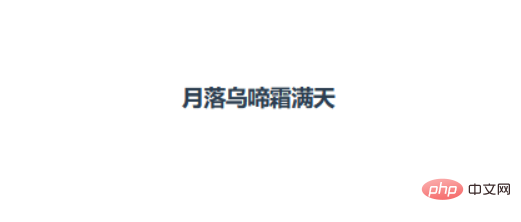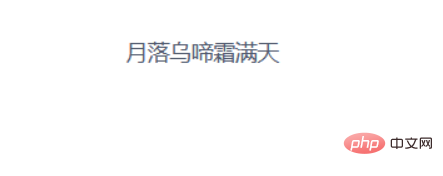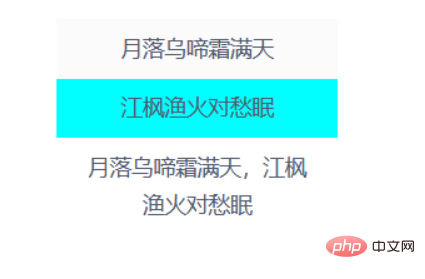What binding data does vue use?
Vue binding data method: 1. Use double braces "{{}}" to give the data to the page; 2. Use the vue instruction, the v-bind instruction can achieve one-way data binding, v -model directive can realize two-way data binding; 3. Use ":", just add ":" before the label attribute for binding; 4. Use "${}", just splice the string before the data Use "${}".

The operating environment of this tutorial: windows7 system, vue3 version, DELL G3 computer.
Several ways for Vue to bind data
1. Use Double braces '{{}}' give data to the page
<template>
<div>
<h3 id="msg">{{ msg }}</h3>
</div></template><script>export default {
data(){
return{
msg:'月落乌啼霜满天',
}}}</script>
<template>
<div>
<input>
</div></template><script>export default {
data(){
return{
msg:'月落乌啼霜满天'
}}}</script>The v-model is used here to bind the value of the input box to msg, or it can also be v-text v-html v-bind, etc.

1. One-way data binding (v-bind): Data can only flow from data back to the page (one-way transfer)
2. Two-way data binding (v-model): Data can not only flow from data to page, but also from page to data
(1) Two-way data binding is generally applied to form elements (such as input select checkbox, etc.)
( 2) v-model:value can be abbreviated as v-model because v-model collects value by default
3. Add ':' before the label attribute to bind
<template>
<div>
<cellgroup>
<cell></cell>
</cellgroup>
</div></template><script>export default {
data(){
return{
msg:'月落乌啼霜满天',
}}}</script>
Bind the value of msg to the title of the cell cell through:title. If you forget to add ':' in front of the title attribute, the page display will change. Like this:

The value given to title is not the variable msg in data() but the string "msg"
4. Use `${}` to splice strings before data
<template><!-- 有时我们需要给要绑定的值拼接字符串,比如需要控制样式,拼接字符串时,那我们就需要这样写`${}`, -->
<div>
<cellgroup>
<cell></cell>
<!-- 将‘江枫渔火对愁眠’单元格 的背景色绑定到 color:'aqua' -->
<cell></cell>
<!-- 将‘江枫渔火对愁眠’拼接在msg:'月落乌啼霜满天'后-->
<cell></cell>
</cellgroup>
</div></template><script>export default {
data(){
return{
msg:'月落乌啼霜满天',
color:'aqua'
}}}</script>
vuejs video tutorial 、web front-end development】
The above is the detailed content of What binding data does vue use?. For more information, please follow other related articles on the PHP Chinese website!

Hot AI Tools

Undresser.AI Undress
AI-powered app for creating realistic nude photos

AI Clothes Remover
Online AI tool for removing clothes from photos.

Undress AI Tool
Undress images for free

Clothoff.io
AI clothes remover

AI Hentai Generator
Generate AI Hentai for free.

Hot Article

Hot Tools

Notepad++7.3.1
Easy-to-use and free code editor

SublimeText3 Chinese version
Chinese version, very easy to use

Zend Studio 13.0.1
Powerful PHP integrated development environment

Dreamweaver CS6
Visual web development tools

SublimeText3 Mac version
God-level code editing software (SublimeText3)

Hot Topics
 How to disable the change event in vue
May 09, 2024 pm 07:21 PM
How to disable the change event in vue
May 09, 2024 pm 07:21 PM
In Vue, the change event can be disabled in the following five ways: use the .disabled modifier to set the disabled element attribute using the v-on directive and preventDefault using the methods attribute and disableChange using the v-bind directive and :disabled
 Adaptation of Java framework and front-end Vue framework
Jun 01, 2024 pm 09:55 PM
Adaptation of Java framework and front-end Vue framework
Jun 01, 2024 pm 09:55 PM
The Java framework and Vue front-end adaptation implement communication through the middle layer (such as SpringBoot), and convert the back-end API into a JSON format that Vue can recognize. Adaptation methods include: using the Axios library to send requests to the backend and using the VueResource plug-in to send simplified API requests.
 What does async mean in vue
May 09, 2024 pm 07:03 PM
What does async mean in vue
May 09, 2024 pm 07:03 PM
Vue's async modifier is used to create asynchronous components or methods to achieve dynamic loading of components and execution of asynchronous operations to avoid blocking the main thread.
 The function of render function in vue
May 09, 2024 pm 07:06 PM
The function of render function in vue
May 09, 2024 pm 07:06 PM
The render function in Vue.js is responsible for converting component data into virtual DOM, which can improve performance, enable templating, and support cross-platform. Specific functions include: 1. Generating virtual DOM; 2. Improving performance; 3. Implementing templates; 4. Supporting cross-platform.
 How to use v-show in vue
May 09, 2024 pm 07:18 PM
How to use v-show in vue
May 09, 2024 pm 07:18 PM
The v-show directive is used to dynamically hide or show elements in Vue.js. Its usage is as follows: The syntax of the v-show directive: v-show="booleanExpression", booleanExpression is a Boolean expression that determines whether the element is displayed. The difference with v-if: v-show only hides/shows elements through the CSS display property, which optimizes performance; while v-if conditionally renders elements and recreates them after destruction.
 Nuxt.js: a practical guide
Oct 09, 2024 am 10:13 AM
Nuxt.js: a practical guide
Oct 09, 2024 am 10:13 AM
Nuxt is an opinionated Vue framework that makes it easier to build high-performance full-stack applications. It handles most of the complex configuration involved in routing, handling asynchronous data, middleware, and others. An opinionated director
 From PHP to Go or Front-end? The suggestions and confusions of reality from experienced people
Apr 01, 2025 pm 02:12 PM
From PHP to Go or Front-end? The suggestions and confusions of reality from experienced people
Apr 01, 2025 pm 02:12 PM
Confusion and the cause of choosing from PHP to Go Recently, I accidentally learned about the salary of colleagues in other positions such as Android and Embedded C in the company, and found that they are more...
 How to use elementui for render function in vue
May 09, 2024 pm 07:09 PM
How to use elementui for render function in vue
May 09, 2024 pm 07:09 PM
The render function is used to create the virtual DOM in a Vue.js application. In Element UI, you can integrate Element UI components into the render function by rendering the component directly, using JSX syntax, or using scopedSlots. When integrating, you need to import the Element UI library, set properties in kebab-case mode, and use scopedSlots to render slot content (if the component has slots).






